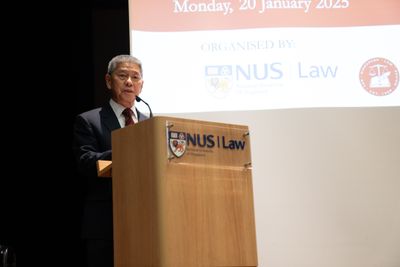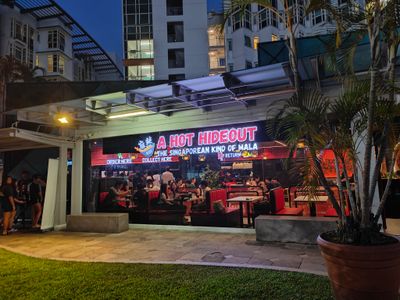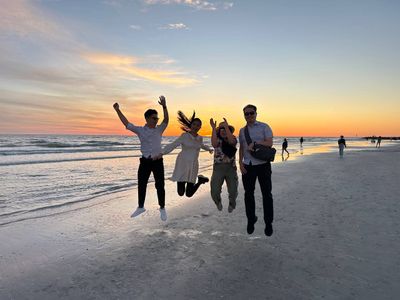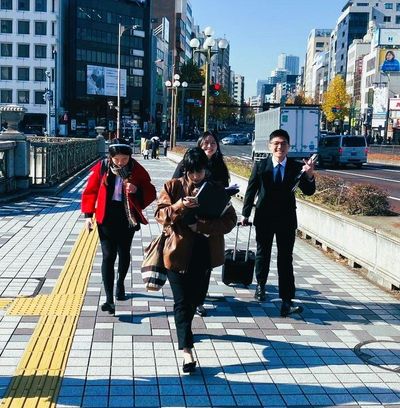Harry Elias Partnership was founded in 1988 by Mr Harry Elias, Senior Counsel, who was widely recognised as one of Singapore’s foremost litigation lawyers. The firm has an established reputation as one of the leading full-service firms in Singapore.
On 22 January 2021, two partners from the firm, Mr Andy Lem and Ms Sharmini Sharon Selvaratnam were invited as representatives to answer some questions about the firm and the practice of law in general. The following article will outline some of questions and answers provided during the session.
How do you show that you are interested in/a good candidate for a firm?
1. Apply to a limited number of firms, do the research on those firms thoroughly, be able to express it at the interview
2. Show a maturity beyond your years — young lawyer going beyond the task in front of them and questioning from the perspective of the bigger picture, or questioning if the approach to the task should be improved, etc. Wanting to leave behind systemic change in the way that task is done, if it makes sense in that situation.
3. Owning your work — if you have taken over a file, you don’t just read it, you absorb it as if you had been the one to make the file. You’re not there to just do assigned work, you’re there to be part of a team doing meaningful work, and therefore you must feel ownership of such an important task by giving proportional time and mental energy.
Does the Family Law Practice have its own culture?
1. The family practice is housed on a different level from the litigation and disputes department. They have a culture of “work hard, play hard”. The loudest group and the one having the most fun is the family practice, especially one of the partners, Carrie Gill.
What about the general firm culture? What can be expected at an internship?
1. Everyone experiences the firm culture differently with their own eyes so come and experience it yourself.
2. The people are generally hardworking such as attending interviews, consulting experts and doing a lot of prepwork.
3. As an intern, we also expect you to take ownership of your work because as interns we want to assess and be impressed by you. You will be involved in a lot of research, a lot of drafting. We will also involve interns in preparation for hearings, appeals or client meetings. We want you to learn the different ways our associates carry out their tasks and we want you guys to see how to do those tasks and learn if their way is the best way or not.
4. In general, when talking about your CV, a 2 week internships does not look as impressive as a longer internship such as a 2 month internship. He would rather have an intern who in the past had done a 2 month internship than another who had done four 2 week internships.
How Long are Internships with the firm?
1. You suggest the duration – we prefer longer periods otherwise it will be meaningless.
What do you look out for in TC applications, in terms of CV and grades?
1. Of course we look at grades but we understand a couple of mistakes can be made in a module or two.
2. We look for well-rounded individuals e.g. you are a sports person, loves playing music or to backpacking. It is nice to hire real human beings and this helps to assess if you will be “a good fit for each other”.
3. If you are a liverpool fan, I will definitely let you win.
How many trainees does your firm generally retain after traineeship?
1. we take in 12-14 with a high retention rate. Retention rate has been around 60-100% depending on the batch in the past few years.
2. Its not fixed. We do retain our trainees since we don’t take in that many.
3. 1-2 trainees per practice group/litigation team. By and large we retain them.
What kind of training can we expect at your firm?
1. Trainees will be quite sick of their partners by the end of the traineeship – a lot of facetime with partners.
2. Not that big that we can pawn off trainees to associates, so naturally you will get to work with the entirety of the team — teams are 2-3 people usually. Pick up their skills and knowledge based on this.
How is Harry Elias’ corporate practice?
1. Our corporate practice is full range. They do capital markets, M&A, general corporate work, debt markets, equity, etc.
2. But we are especially strong in funds work and we are on the MAS panel as far as funds work is concerned – that is not something that is easy to achieve. Our corporate is the full spectrum.
3. Corporate has more structure in its schedule, like drafting days where they get together as a team to do that. In litigation we don’t have that kind of organisation.
What are some interesting cases you guys have dealt with or are dealing with
1. Ms Sharmini is in trial beginning next month, and her matter relates to election fraud relating to associations.
2. Mr Andy Lem is in trial regarding a conspiracy case and investment related claims for misrepresentation.
3. There a lot of different kinds of cases dealing with the whole gamut of torts, contract claims, investment claims, etc.
Curious about sports litigation which your firm practices in — what is this?
1. Sport law is not just about athletes — we also act for horse racing clubs. Racing rules etc. that govern sports need to be enforced one way or the other. Such sports entities also face issues relating to their corporate constitution, disciplinary issues relating to members, etc. This shows how many interesting areas law regulates.
What is the schedule like for a litigator?
1. It Depends. Very busy in general. Each stage of litigation is different, and dealing with multiple cases is naturally harder. There may be downtimes but you can suddenly be very busy. This is driven by court deadlines.
2. Both speakers are currently approaching trial and so there’s a lot of work to be done right now. 4 applications fixed for a full day hearing next Tuesday.
3. Large-scale litigation, at the pleadings stage and drafting stage, not much court-going.
4. Doing prosecution work is less complex but going to court quite often, lots of mentions and communicating with other side, etc. a lot of work on your feet.
How do you maintain work-life balance?
1. It depends on what you want. If you want a career in law and want to do well, you need to realise that work life balance won’t feature very much. There’s no shortcut here, no free lunch. If you want to develop as a lawyer you have to show your mettle.
2. However, it doesn’t mean that you should stay in the office just to show off. You should prioritise efficiency and judgement — show that you have put in the time to think about the best approach, strategy, argument, research by showing quality work.
3. Steep learning curve when starting out. Your problems cant be solved by reading a textbook. It will take 3-4 years to assert some control on your life and work — otherwise you’ll be running around trying to catch up with work and learning how to do things right. Things don’t stop but you learn where everything is, and know how to reach for it and just use it naturally, be it a case, a skill, a person, a file.
4. After a case you find the time to spend with the kids and family for a short while and you treasure it.
What are some challenges that lawyers face?
1. time management, understanding which tasks are more important, how much time each task takes, if you are able to even handle what is on your plate and how to work out workloads in a team.
Why did you choose Harry Elias – what makes Harry Elias stand out?
1. Heard they were looking for football players — we play at the cage. Firm sponsors it.
2. Andy Lem: But for real, when I was in my 3rd year of law school, Cambridge invited Mr Harry Elias SC to give a talk to us. So this portly man waddled in and he left quite an impression on me. For those of you who are not aware, Mr Elias passed away last year — we lost our founder. Its still a big loss — sometimes I still am in disbelief.
3. Back to your question, he gave a speech and I’ll never forget what he said — “dont let anybody tell you otherwise, but we are an honourable profession”. He spoke with such conviction that it resonated with me, and when I assisted him in the cases we had done, the way he conducted himself held true to his words and gave me a role model to follow in the steps of.
4. Sharmini: I joined Harry Elias through a pupillage at another firm and so I have no experience to compare to other firms, and worked with Mr Elias very closely. I worked for a lot of different partners because of the pool system. They are very nice people to work with — they do scold you but they have a lot of integrity, they may scold you but won’t blame you or let you take the fall. I have a lot of respect for the partners in the firm.
5. Andy Lem: We acted for the Republic of Philippines in the case of Markov’s Millions, worked for Long Johns something, worked in a case regarding timber in Sarawak, and then with Sabah. We have a variety of work and its really something, especially when you see how Mr Elias and the partners carry themselves and how they think. A dentist cleans teeth and is done, but a lawyer lives and breathes law, so when the partners wake up they call you and tell you their thoughts on the case at 6-7am and this inspires you to see how to become a true lawyer.
What inspires you to pick a practice?
1. More about elimination than interest – choose corporate if you fear public speaking or embrace your introversion. Choose litigation if you hate contracts and transactional work.
2. Specialisation takes care of itself when you start practice, and you learn more to make an informed choice. Partly out of your hands if your firm specialises more in one area.
3. I have a colleague who did a year of litigation, didn’t like it, came out of practice in-house, and didn’t like it, went into banking, and has been in banking for 15 years.
4. Observe the people around you and ask if you want to be doing that in the next 5 years. Intern and practice with your eyes open – the answer is clearer than you think.
What’s your firm’s pro bono involvement?
1. We do various pro bono work — we kind of allocate it according to department. Family department advise on matrimonial cases, corporate does more corporate related work, clinics only have our litigators going down.
2. We are the first to do and are still one of the only firms to have signed an MOU with a pro bono office to commit to a certain number of cases. We have done that ever since.
3. Mr Elias was among the lawyers who started CLAS and the pro bono spirit has remained. We did a rape case that lasted almost 2 years under the CLAS scheme.
What are the differences between small, mid and large firms?
1. Our firm has 80 lawyers so we’re a big-mid size firm. The bigger the size, the bigger the teams.
2. Small firms tend to be able to do a bit of everything – they are exposed to a lot of areas. Can have a bit of criminal, family, corporate, litigation practice.
3. At Harry Elias, you may have criminal cases even in civil & commercial, maybe due to CLAS or if a client misbehaves, but 99% of the time we can specialise and that lets us build deeper understanding and capability.
What are some welfare Harry Elias has?
1. We basically have people who understand you. If you need to rush off because your kid has a stomachache in school, then no one will bat an eye or ask another question
2. If we ask to play football or do runs or do the MBS stair climbing thingy, the firm will approve it and get us t shirts and sponsor such events, they’re quite open to this sort of stuff
Why is the attrition rate so high in the law practice?
1. I don’t know because I’m still in the profession so I cant really answer why people leave.
2. A lot of factors, it is not an easy profession. its nice to call yourself a lawyer but it is not easy.
Credit: VAIBHAV NAG






